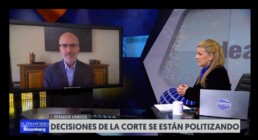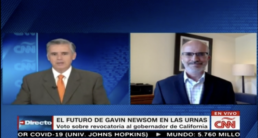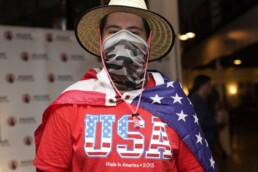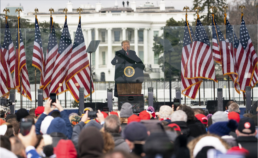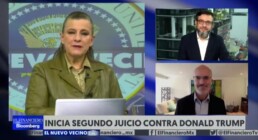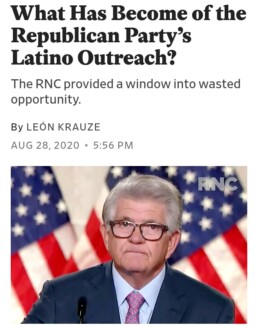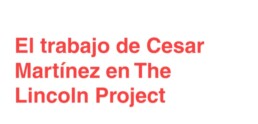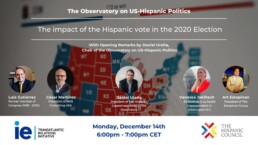EL PAÍS interviews Cesar Martinez on Democrat Beto O'Rourke
On Democrat Beto O'Rourke's barging into a press conference being held by Governor Greeg Abbott in Uvalde a few hours after an 18-year-old boy killed 19 children and 2 teachers at a Texas school.
"That press conference was a cathartic moment," "Time has proven him right, because now the Republicans' idea that there is nothing better against a bad guy with a gun than a good guy with a gun has been dismantled. There were dozens and dozens of good guys there who couldn't take the shooter," says Cesar Martinez in a report on the Democratic candidate for Governor of Texas.
Cesar Martínez-Gomariz talks to Ana María Salazar about the Supreme Court's controversial decision.
A pleasure to speak with Ana María Salazar on El Financiero/Bloomberg TV
On the controversial decisions of the Supreme Court.
https://twitter.com/elfinancierotv/status/1542357261586092032?s=24&t=47neUH16jdOum0QAxyGHcg
Poll: Hispanics care more about the economy, jobs than social issues; I don't like 'latinx'
(The Center Square) - A year into another election cycle, a national survey of Hispanic Americans shows that their opinions, interests and preferences do not align perfectly with either of the country's two major political parties.
A joint effort between Arizona-based OH Predictive Insights, Chris Mottola Consulting and MAS Consulting surveyed 2,000 members of the Hispanic community from 18-25 March.
When asked which issues matter most to them, 29% said that COVID-19 is the most urgent problem facing the nation. After the pandemic, 19% think the most important issue is jobs and the economy, followed by health care. Only 6% said immigration, race relations and education are the most urgent problems.
Most oppose further construction of a wall on the country's southern border.
Democrats have advantages in terms of perception, according to respondents. More than a third said the Democratic agenda is better for the economy, an issue where Republicans typically win over voters, who were 4 percentage points behind their counterparts. Democrats had huge advantages over the Republican Party on how they address the environment, health care and when asked to name "this party cares about me".
The majority of respondents came from four states: California, Texas, Florida and New York. The respective respondents from each state were divided along similar ideological lines to others in their state. Thirty-four percent of Californians identified themselves as "liberal", while 20% considered themselves "conservative". Hispanic Floridians were evenly split at 23%, identifying with each ideology.
One silver lining for Republicans, according to Mike Noble, head of research at OH Predictive Insights, was that many Hispanics think neither party really cares about them, and agree with the sentiment that they are "disgruntled" on both sides.
"The data reveals a whole swathe of the electorate that is not being talked to and the solution is simple: capture the preference by messaging on the pressing issues within the Hispanic community," he said.
This large swathe of voters considers itself independent and politically moderate.
"It's a red flag for both sides and an opportunity for whoever cares to pay more attention to the country's largest minority group, responsible for 52% of our population growth," said César Martínez of MAS Consulting.
A near-unanimous opinion was a lack of interest in being labelled "latinx", a term used by some to be more inclusive of the non-binary gender norms inferred by Latinos and Latinos. Only 1% of the 2,000 respondents preferred to be called the term.
Analysis: Latino Republican Senators Cruz, Rubio and the backing of Trump's caudillo playbook
Donald Trump disrupted the rule of law and democratic norms, behavior familiar to Latinos whose families have left authoritarian countries and the kind Cruz and Rubio denounce.
As was true throughout his presidency Donald Trump could count on the Senate's two Latino Republicans, Sen. Marco Rubio and Sen. Ted Cruz, to back him up.
In his four years in office, they had rarely opposed him and often enabled him.
Cruz of Texas was one of the leaders of the group of Republicans who followed Trump on questioning fair election results and voted against certifying President Joe Biden's win even after the violent attack on the Capitol.
Although Rubio didn't join Cruz in voting to dispute the election results and criticized the Capitol attack, he did not condemn Trump by name or tie the violence to him.
On Saturday both refused to convict Trump on the impeachment charge that he had incited the deadly violent Capitol attack, opening the door for the former president to run again, although both are seen as wanting to run for president too.
Trump sought to change the outcome of free and fair elections run by bipartisan officials and found to be legitimate by the courts, including the Supreme Court. He then insisted Vice President Mike Pence reject the process certifying Biden's win, and when Pence didn't do it Trump attacked him on Twitter as Pence and his family fled a dangerous mob.
With those votes, Americans saw two of the most strident voices against anti-democratic governance in Venezuela, Cuba and other parts of Latin America reaffirm the actions of a president who has mirrored pages from the playbook of autocratic governments - both from the left and the right.
Generations of Latin Americans have paid the price of wrenching political, social and economic upheaval as a result of anti-democratic presidents, oftentimes sanctioned by the U.S. Currently, it's one of the reason so many migrant families leave Central America. Historically, these autocrats, referred to as caudillos (strongmen, although some are women) have disregarded the rule of law, questioned fair election results and flouted the orderly transfer of power.
In his time in office, Trump opened the door to white supremacists and nationalists in the White House, spread misinformation and conspiracy theories and lied repeatedly. He declared journalists to be "enemies of the people," tried to bend laws and institutions and saw the government as part of his political campaign, such as using the White House for the national convention.
Senators Cruz and Rubio are "reaffirming that they are not on the side of democracy," said César Martínez-Gomariz, a political consultant who has worked on several Republican presidential campaigns.
"I don't know if they can look in the faces of their fathers and say, 'Hey guess what? You ran out on a dictator. I come here and I'm supporting a guy who wants to become one,'" he said.
Apart from the riot, one of Trump's most damaging, anti-democratic legacies was refusing to accept Biden's legitimate win - and the fact many Republicans didn't push back.
Former congressman Carlos Curbelo, a Florida Republican and son of Cuban exiles, said that had he been in Congress, he wouldn't have voted to dispute Biden's Electoral College vote wins, as seven Latino House Republicans did.
"At the end of the day, the decision was whether to enhance the lie that the election was stolen and sow doubts about certified election results or to accept the results," said Curbelo, an NBC News analyst.
On Jan. 8, Trump tweeted he would not attend Biden's inauguration. New York University liberal studies professor Patricio Navia later tweeted:"Just like Cristina Fernandez in 2015. Donald Trump is the first Latin American President in the U.S."
The reference was to Fernandez de Kirchner, Argentina's former president and now its vice president, who refused to attend her successor's inauguration in 2015. Perpetrating what is known as the Big Lie, Trump has still not conceded he lost the November election.
"Donald Trump behaves as a typical Latin American authoritarian figure and it seems that some Latino legislators in the U.S. are fine with that, provided the ideologies and policies that Trump defends are associated with free markets," said Navia, who also is a politics professor at Universidad Diego Portales in Santiago, Chile. "It's not that they don't like dictators, it's that they don't like left-wing dictators."
Navia said Rubio's and Cruz's acquittal of Trump in the context of their opposition to anti-democratic socialist and communist governments reminds him of the quip often attributed to Groucho Marx: "Those are my principles and if you don't like them...well, I have others".
After the Jan. 6 riot, Latino families who fled countries with anti-democratic and turbulent politics looked on in disbelief and dread.
"I had always been raised to believe that somehow this country was different," said filmmaker Cristina Constantini, 32, "that a mob of angry and violent supporters of a tyrannical leader couldn't just force their way into our Capitol building."
The images of the deadly riot brought Constantini's father to tears, she said; he was brought to the U.S. as a child fleeing Argentina's military dictatorship. "I think it was like a sense of mourning for something that he thought couldn't ever break in a way things are broken in other countries," Constantini said.
Only two Latino Republicans in the House of Representatives, Reps. Jaime Herrera Beutler of Washington and Anthony Gonzalez of Ohio broke ranks with fellow Latino Republicans in the House and voted to impeach Trump.
Gonzalez, whose father fled Cuba, decided to vote for impeachment after he spoke with law enforcement officers and reviewed video of the riot. Gonzalez accused Trump of abandoning his responsibility while members asked for help.
There certainly are Latinos who support Trump and cheer his acquittal. But Rubio and Cruz's defense and that of other Latino lawmakers who stood with him creates a new backdrop that diminishes their denouncements of threats that presidents in other countries pose to democratic processes, in light of their unwavering fidelity to Trump.
"I think the next time Marco Rubio or Ted Cruz go out there and say-you shouldn't be stopping the votes of the democratic process' they are going to go, 'Hey, senators, Mr. Rubio or Mr. Cruz, get on the plane and go back. Look at your mess," Martinez-Gomaris said.
Trump's acquittal opens the door to him running again. Like Evo Morales of Bolivia, Trump will continue to run the party, Navia said. "He doesn't need to be the president to be the man running the show," he said.
Prior to the impeachment vote, Rubio had said the impeachment trial was bad for the country and it was important to move on. But it won't be easy in a country that Trump has left much more polarised, with polls showing many Republicans still disbelieving Biden's win.
"They modified their principles because it was convenient," Navia said. "The problem is sometimes you go too far and it's difficult to come back - they can no longer turn against Trump because they are so central, so part of what Trump has done, that they are going to pay the price anyway."
Panorama facing the US in the face of the second impeachment trial against Donald Trump.
At #TheNewNeighbour Cesar Martinez-Gomariz political consultant, and Carlos Rodríguez, director of Spanish-language content for
In #ElNuevoVecino Cesar Martinez-Gomariz (@CesarMASconsult), political consultant, and Carlos Rodríguez(@carlos_rgz), director of Spanish content for @business, analyse with @Amsalazar the outlook facing the US ahead of the second impeachment trial against Donald Trump. pic.twitter.com/01RKVM5Q1c
- El Financiero TV (@ElFinancieroTv) February 12, 2021
New Lincoln Project ad blitz targets Latino voters in crucial red states
The Lincoln Project, a political action group made up of anti-Trump Republicans, is gearing up to launch an ad campaign targeting Latino voters in the red states of Florida, Texas, and Arizona, Newsweek has learned.
The bilingual, six-figure ad buy is aimed at Puerto Ricans in Florida and Latino voters in Arizona and Texas, and "represents the first save in micro-targeting Hispanics who the group feels has reason to dislike Trump's leadership and rhetoric on issues that matter to them," Newsweek reports.
"The ad brings together George W. Bush veterans from his 2000 campaign, when exit polls showed he received a sizable 35 percent of the Latino vote, including Lincoln Project co-founder Mike Madrid, consultant Cesar Martinez, and legendary ad man Lionel Sosa, who helped Ronald Reagan and Bush garner larger than expected support from Hispanics," reports Newsweek.
What Has Become of the Republican Party's Latino Outreach?
Twenty years ago, during the Republican convention that nominated George W. Bush in Philadelphia, the Republican Party made a concerted effort to talk to Latino voters all across the United States. The party had realized that Bush, who spoke some Spanish and grew up in Texas, could open the door to the country's fastest-growing minority. Republican strategist César Martínez Gomariz was part of the team that crafted Bush's message. "We tried to make a real effort to appeal to Latinos from the very beginning of the convention," Martinez Gomariz told me recently. In 2012, Mitt Romney chose Hispanic Sen. Marco Rubio to deliver the convention's keynote speech for the same reason.
The Republican Party has changed since then.
Last week, Democrats were criticized, including by me, for the lack of Latino speakers in the primetime slots of the party's convention. They deserved the flak. Still, compared with Donald Trump's Republican Party, the Democrats' efforts to include Hispanics seem almost admirable. The Republican National Convention's failed attempt at Latino inclusion has shown the limits of Donald Trump's recent outreach efforts.
In July, Trump dedicated a full week to focus on Latinos. He invited Mexico's President Andrés Manuel López Obrador to the White House for an official visit (López Obrador reciprocated by publicly praising Trump). The president then hosted a summit of Latino leaders, where Robert Unanue, the fawning Goya Foods CEO, called Trump's presidency "a blessing." That same week, Trump announced a plan to support Latino entrepreneurs. Trump's sudden love for all things Hispanic is no coincidence. Some polls have suggested that Trump could have an opening with Latino voters. One in particular showed Trump inching close to 35 percent support among Latino voters, 7 points above the 28 percent he got in 2016. If those numbers hold on Election Day, they could make a real difference in states like Arizona and Florida. Although some of these polls are controversial (specialized Latino pollsters have long criticized their methodology), the opportunity to appeal to Latinos could be there for Trump's taking.
If it is, this week's RNC did not help. On the first night of the convention, the only Latino who could truly speak to the immigrant experience was Maximo Alvarez. Born in Cuba, Alvarez is a controversial businessman. He also represents a very specific demographic. By comparing Joe Biden to Cuban dictator Fidel Castro, Alvarez was appealing not to America's broad and diverse Hispanic community-whom Trump intended to court during his recent "Latino week"-but to a very narrow and politically valuable sliver of the Latino electorate: the one in Florida. "If you watch the #RNC2020 and listen to the Latino speakers, you would think the only narrative our community has is fleeing Castro's Cuba," journalist Julio Ricardo Varela tweeted after listening to another RNC speaker later in the week, Florida Lt. Gov. Jeanette Núñez.
Then there is, of course, the president's record. Despite Trump's cynical attempt to present himself as welcoming of immigrants by naturalizing five of them at the convention, his record on the issue is abysmal. His presidency has made life miserable for thousands of potential refugees and millions of undocumented immigrants already in the country, the majority of which are Hispanic. The administration has chosen to expose millions of essential farmworkers, many of them undocumented immigrants, to the effects of the coronavirus and the consequences of the subsequent economic crisis. Although Latinos care about a number of issues other than immigration, according to a recent Pew Research poll, "83% of Hispanics say it is a very or somewhat important U.S. immigration policy goal to establish a way for most immigrants in the country illegally to stay in the U.S." I didn't see anything at the RNC that would change their minds.
Cesar Martinez's work on The Lincoln Project
The Lincoln Project is an American political action committee formed in late 2019 by several prominent Republicans and former Republicans. The committee's goal is to prevent Donald Trump's re-election in the 2020 presidential election and defeat his supporters in the U.S. Senate.
The impact of the Hispanic vote in the 2020 election
Next Monday, December 14th at 18:00 (Madrid) // 12:00 (EST) a new session of The Observatory on US-Hispanic Politics of the Instituto de Empresa will take place to analyze the role of the Hispanic vote in the last elections of November 3rd.
This event will serve as the launch of The Hispanic Council's new report "The Impact of the Hispanic Vote on U.S. Elections," which will be available next Monday.
When: Monday 14 December at 18:00 (Madrid) // 12:00 (EST).
Who:
- Daniel Ureña, president of The Hispanic Council.
- Luis Gutiérrez, former U.S. Congressman.
- César Martínez, political consultant and president of MAS Consulting in the US.
- Art Estopinan, president of The Estopinan Group.
- Vanessa Jaklitsch, journalist and Washington, D.C. correspondent.
How: online via Zoom. Register here.


